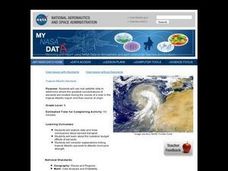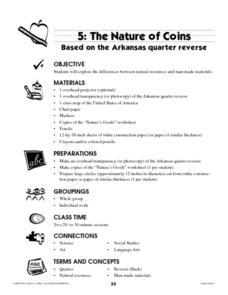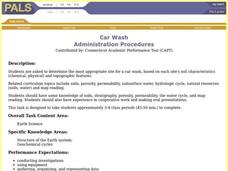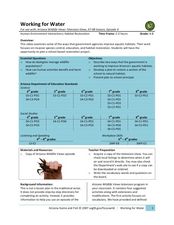Curated OER
Troical Atlantic Aerosols
Students explore the effect aerosols have upon he weather and climate. They observe NASA satellite images to explore and draw conclusions about aerosol transport. From studying the images, students track the path of aerosols. They...
Curated OER
Wind Circulation, Surface Currents and Climate
Students describe connections between wind patterns, surface currents, and ocean climate zones. In small groups, they color the ocean climate zones in four different shades of blue. Students then answer questions like what four...
Curated OER
Water and Ice
Students study the liquid and solid states of water. In this water states lesson, students complete three experiments to study water as it cycles from a liquid state to a solid state and back. Students finish with a Venn Diagram...
Curated OER
A Natural Connection to the Azores
Students use primary sources to examine whaling voyages, biology, and geography. In this geography lesson, students analyze ship logs and plot locations of animals and determine routes using latitude and longitude.
Curated OER
Puberty/Adolescence: Am I Normal?
Young scholars inspect psychology by answering a list of health study questions. In this puberty lesson, students identify the impact teenage years have on boys and girls. Young scholars define a list of scientific terms and answer study...
Alabama Learning Exchange
Researching Hurricanes with Technology
Young scholars explain the components that make up a hurricane.
Curated OER
Water Issues on Puerto Rico and Oahu: A Comparison of Two Islands
Fifth graders explore how the tow islands receive and use fresh water. They also address some of the threats to the fresh water supply on each island. Students explore the lesson objectives through water cycle models and experiments.
Curated OER
The Nature of Coins
Pupils examine the Arkansas state quarter and identify natural resources depicted on the quarter. They compare natural resources to man-made resources and identify examples of each.
Curated OER
Car Wash
Learners determine the most appropriate site for a car wash, based on each site's soil characteristics (chemical, physical) and topographic features. They perform an experiment to determine the changes to three different soil types when...
Curated OER
A "Sedimental" Journey-Sediment Collection
Students are asked how they would gather a sample of sediment from a lake, stream, river, pond, or swamp. They discuss safety concerns involving sample collections. Students are instructed to stay out of the water and to be careful not...
Curated OER
I Spy
Second graders play the game I Spy to help identify objects made from rock. They investigate the properties and uses of rocks and go on an I Spy search on the playground. They sort pictures according to living and nonliving objects.
Curated OER
A Walk in the Woods
Eighth graders observe and identify the different levels of the forest. In this forest zones lesson students observe, identify and name a variety of forest components and describe how humans impact the forest ecosystem.
Curated OER
Technology__
Seventh graders compare today's technology to that of the Romans. In this technology lesson students understand how the Romans overcame many difficulties.
Curated OER
Totem Poles -- Storytellers of Long Ago
Third graders discover the main purpose for totem poles was to communicate with others. In groups, they compare and contrast the four types of totem poles and the various symbols used. They write their own stories based off of pictures...
Curated OER
Plate Tectonics
Students identify that most of mountain ranges found on all major land masses and in the oceans are external reflections of tectonic movements within the earth. They identify that earthquakes and related phenomena are caused by the...
Curated OER
Working for Water
Students examine the ways that government works to help improve aquatic habitats. In this water habitats lesson students view a video and plan a school restoration project.
Curated OER
Structure of the Earth
Sixth graders investigate earthquakes and volcanoes. They demonstrate fault lines with a folded piece of paper, conduct an erosion experiment, and construct a volcano using clay, baking soda and vinegar.
Curated OER
Ecology and the Conservation of Natural Resources Lesson 2
Students compare and contrast abiotic and biotic factors. They discuss how these factors effect ecosystems. They answer questions to complete the lesson.
Curated OER
Trouble in the Troposphere
Students create graphs using NASA data, compare ozone levels of several U.S. cities, analyze and evaluate the data and predict trends based on the data, and discuss and describe how human activities have modified Earth's air quality.
Curated OER
Looking Inside Cells
Seventh graders analyze and identify the role of the cell membrane and nucleus. They create flash cards to help them review cell structures. They also compare plant and animal cells.
Curated OER
Natural Disaster Blooms Taxonomy
Students complete activities that lead to greater understanding of the variety of natural disasters that occur all over the world.
Curated OER
Shake, Rattle And Roll: Studying the Effects of an Earthquake
Students gauge earthquake intensity by reviewing firsthand accounts. They use the Modified Mercalli Intensity Scale and newspaper articles to estimate the strength and effects of a past earthquake.
Curated OER
Motion of the Sun and Earth: Using a Playground Model to Explore Rotation and Revolution
Students experience the rotation of the Earth and the Sun and the Earth's revolution around the Sun, using a playground mode.
Curated OER
Ice Age Challenge Game
Students use a website to do various projects about the ice age and discover the route taken by the first arrivals are unknown and are the subject of a great deal of debate and research.

























